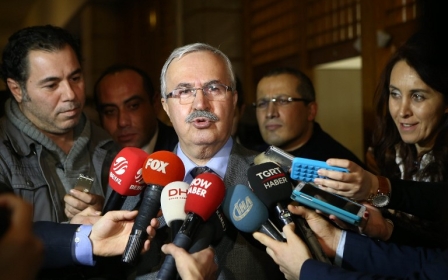Turkish lira sinks to record low against the dollar

The Turkish lira sank to a fresh record low against the dollar on Friday, as it remained under pressure due to expectations that the Central Bank may cut interest rates as early as next week.
In afternoon trading on Friday, the lira fell to as low as 2.43 to the dollar after hitting a record low of 2.41 late on Thursday.
Against the euro, the currency lost 0.8 percent in value to trade at 2.75 lira to the euro.
The currency has been under pressure since the governor of the Turkish Central Bank hinted on Tuesday that the bank could hold an extraordinary meeting as early as next Wednesday to cut rates.
"As a result of rate cut expectations, the lira remained under depreciation pressure," Finansbank economist Deniz Cicek said.
Analysts at Deniz Invest said in a research note that “we read the statement as the Central Bank does not find the recent volatility in exchange rates compliant with its planned rate cuts and wants the market know that they will not do anything that will threaten the permanence of disinflation.”
Economy Minister Nihat Zeybekci on Friday said the fall of the Turkish currency was "only natural, and not worrisome," urging the Central Bank to go ahead with plans to loosen its monetary policy.
"We are already too late to cut interest rates. I don't believe that the fall of lira would have an impact on rate cut expectations," he said.
"It is pointless to tolerate high interest rates due to concerns."
The lira was also hit by Federal Reserve's upbeat outlook on the US economy and signals that it was on course to hike interest rates this year.
Turkey's Central Bank is nominally independent, but this has not saved it from very public pressure from President Recep Tayyip Erdogan for aggressive cuts to stimulate growth.
Erdoğan, known for his advocacy of lower interest rates, attacked the bank's interest rate policy on 30 January, saying that "the rates are almost twice the expected inflation. This is a deviation that should be fixed,” he said.
A year ago, the bank aggressively raised key rates to avert a major economic crisis following a steep drop in the value of the the lira.
Last week, it lowered the one-week repurchase rate to 7.75 percent from 8.25 percent, the first reduction in six months. But Erdogan is still pressing for further cuts.
Fighting the 'shadow economy'
Turkey's Finance Minister, Mehmet Simsek announced Friday a reform package which aims to reduce the shadow economy 19 percent by 2018.
In a press conference held in Ankara, Simsek said: “We have already reduced the ratio of the shadow economy to the gross domestic product 6 percentage points since 2002. Now it stands at 26.5 percent.”
“By 2018, with the help of this new program we aim to reduce ratio of shadow economy to gross domestic product to 21.5 percent.”
Simsek said that unofficial employment was down 32 percent, and the government aims to cut it to below 30 percent by the end of program.
“In 2002, unofficial employment was 52 percent. Now it stands at only 35 to 36 percent. This is also very high, but we should see the huge success here,” Simsek said.
From now on, companies that employ unregistered workers will be banished from public tenders, he noted.
Also, as part of the new reforms, customs houses will be renovated, every cargo crossing Turkish borders will be examined with x-rays to prevent smuggling, and new rules will be introduced to regulate e-commerce.
Simsek said that they aim to accomplish half of these goals by the end of year, as an indication of their commitment to fight the shadow economy.
Stay informed with MEE's newsletters
Sign up to get the latest alerts, insights and analysis, starting with Turkey Unpacked
Middle East Eye delivers independent and unrivalled coverage and analysis of the Middle East, North Africa and beyond. To learn more about republishing this content and the associated fees, please fill out this form. More about MEE can be found here.




